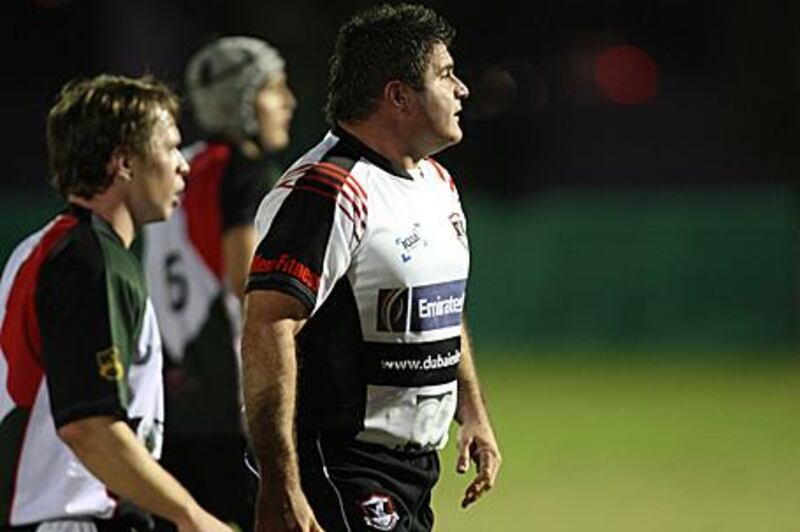First impressions are supposed to last. The adage does not always ring true, however. For example, my initial thoughts on the anomaly that is the Arabian Gulf rugby team did not even last the evening. On arrival in Dubai in 2005, I had been detailed to cover a World Cup qualifying match between the Gulf and China at the old Dubai Exiles ground in Al Awir.
I did not know what to expect when I turned up. For a start, I found it odd that the home side should compete as a region, as opposed to an individual country. Then there were the national anthems. While China's players observed theirs relatively impassively, the Gulf's team of expatriates boomed out something which was unlikely to be the exact words, in what I took to be a show of mock pride. All the while, the players were loudly jeered by their clubmates from the roof of the scorer's hut on the main stand. I thought everyone was taking the mickey. This was not international sport.
How wrong I was. Despite being down, deep into injury-time against a nation who had the pick of more than a billion people, the amateurs from the Gulf claimed an extraordinary win when James Tometski, a Dubai-raised winger, touched down a thrilling move in the corner. Forget France v New Zealand in the 1999 World Cup semi-final, or England's Cook Cup win at Twickenham in 2000 - this was the best game of rugby union I had ever seen. To even think this did not mean something to these part-time rugby players was a gross misunderstanding from a newbie expatriate.
Tomorrow morning, the Gulf's 15-man team will cease to exist in an official capacity. The International Rugby Board (IRB) have ordered a restructuring of the game in West Asia, which will see the Gulf break up, with individual nations going it alone from now on. Seventy former players will be at this evening's Asian Five Nations fixture against Korea at The Sevens, Dubai, after which the curtain will be drawn on 17 years of the Gulf as an international team.
Many of them shed blood, sweat and tears for the Gulf. And teeth. "I was stopped five metres short," recalls Doug Newton, who now runs Alucor in Dubai, of his role in the first Gulf try, against a Namibia side who went on to play at the 1995 World Cup. "In the melee of the subsequent ruck when I was tackled, Mike Burke, our second-rower, kicked my teeth out. I have porcelain ones now. "We had been talking about it before the game. Burkey was saying I was a tough northern lad for not wearing a gum-shield - then went and kicked my teeth out." The honour of scoring that maiden try eventually fell to Chris Matthews, a money-broker from London who moved to Bahrain at the age of 21.
"The big carrot in those days was if you won the Dubai Sevens you got the chance to play in the Hong Kong Sevens," says Matthews, who still lives in Bahrain. "All the top players around the world used to go to Hong Kong. That provided a big incentive to try to get fit and do the best you can." Andy Cole, the affable former front-row forward from England's west country, has book-ended Gulf rugby. He played in the first squad, which was hastily assembled to play in the African group of World Cup qualification in 1993. Now he is overseeing the move towards an uncertain future as the chairman of the Gulf union.
Cole has decorated the home changing room for this evening's match with photos of the international side through the years, from his own personal scrapbook. He has also arranged for the shirts to be presented to each of the players by one of the predecessors in their respective positions. "If they are not up for this one, they never will be," Cole says. The side has always represented a microcosm of the region. Back in 1993, it was heavily dominated by British players, which was understandable, given the compilation of the expatriate workforce at the time.
The balance has altered appreciably. British players still hold the largest number of the shirts - without having an overall majority - in a coalition which today includes a Canadian, a Frenchman and an Omani national. The massive South African influx to the region in recent times also shows. There was not one player from South Africa in 1993. There are three in the 22-man squad for this evening's game, with numerous others on the fringes.
Also, the first squad had nine players who plied their trade in Bahrain. The Seer-based club were by far the dominant force in Middle East rugby at the time, winning the league five seasons out of six from 1991 onwards. Now the squad has a heavy Dubai bias, which is more reflective, it seems, of the fact the greatest concentration of qualified players are based here, rather than the relative strength of the city's clubs.
Dubai sides were a distance off the pace in domestic competition this season, with a resurgent Bahrain and Abu Dhabi Harlequins leading the way in the quest for honours. pradley@thenational.ae






